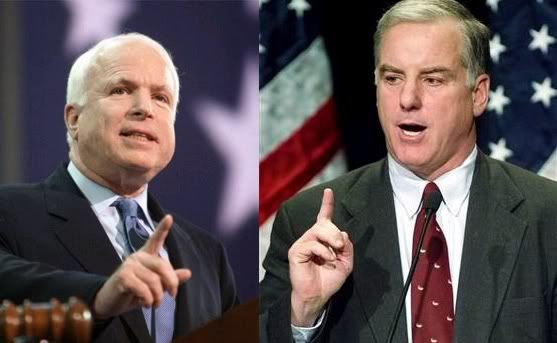Generally speaking, there is a generally-accepted wisdom for third-party leaders in the middle of an election they won't win: when it comes time to debate, be obnoxious and loud.
 That was precisely the tactic that Saskatchewan Liberal leader David Karwacki took last night, launching zingers, and interrupting his competition, NDP leader and incumbent premier Lorne Calvert and Saskatchewan party leader Brad Wall.
That was precisely the tactic that Saskatchewan Liberal leader David Karwacki took last night, launching zingers, and interrupting his competition, NDP leader and incumbent premier Lorne Calvert and Saskatchewan party leader Brad Wall.In a night in which everyone was expecting a grudge match between Calvert and Wall, Karwacki kept himself active enough to keep the two apart, and keep things interesting.
Karwacki, whose party currently holds zero seats in the Saskatchewan legislature, announced that Calvert needed "a $15 prescription for truth serum", and predicted that his party would make up the official opposition following the election. "Thankfully I'm going to be holding Mr. Wall accountable on this particular issue because I don't believe that you're going to form the next government," he told Calvert.
Of course, Karwacki would actually need seats in the legislature before he'll be leader of the opposition.
Furthermore, he has a significant bridge to cross, as only 10% of decided voters in Saskatchewan intend to vote for his party, as opposed to 35% for the NDP. That's a big gap to close.
Fortunately for Karwacki, however, there is an opportunity. 31% of those polled were either undecided or unwilling to participate.
The experience of past leaders, however, may give Karwacki pause. During televised debate in the course of Ontario's 1995 provincial election, then-Liberal leader Lyn McLeod was considered to have significantly harmed her party's chances in that particular election with her disruptive debating tactics.
Ironically, in that particular case, the election was expected to be primarily fought between McLeod's Liberals and Bob Rae's NDP -- in this particular case McLeod allowed the Mike Harris Tories, powered by their Common Sense Revolution electoral platform, to come up the middle and form a majority government.
In the end adopting a disruptive approach to televised leaders' debates may seem promising to many political leaders, but it's extremely risky in the sense that it very seldom works. It may bring attention to a leader and their party, but it's rarely the right kind of attention.
All too often, such tactics turn the electorate off from that leader and their party.
 As for Calvert and Wall, they butted heads throughout the night over numerous issues, particularly each party's prescription drug plan -- the NDP's would cap prescription drug costs at $15 for every resident of Saskatchewan, whereas the Saskatchewan party's plan would do so only for children, seniors, and those below a certain income bracket.
As for Calvert and Wall, they butted heads throughout the night over numerous issues, particularly each party's prescription drug plan -- the NDP's would cap prescription drug costs at $15 for every resident of Saskatchewan, whereas the Saskatchewan party's plan would do so only for children, seniors, and those below a certain income bracket."This is a pretty competitive blood sport and they weren't about to back down," said Ken Rasmussen, a political scientist at the University of Regina.
If Karwacki's interjections accomplished much of anything, he at least forced his opponents to conduct themselves with more civility than they otherwise may have. Brad Wall, for one, had his particular axe to grind.
 "I wanted to deal squarely with some of the fear tactics we have seen and I think we were able to do that as well and hold the government accountable -- they have a record," Wall said after the debate. Certainly, he may have gotten some of his points across, but likely not as much as he would have liked to.
"I wanted to deal squarely with some of the fear tactics we have seen and I think we were able to do that as well and hold the government accountable -- they have a record," Wall said after the debate. Certainly, he may have gotten some of his points across, but likely not as much as he would have liked to.By not allowing his opponents to savage one another, however, and by calling the election in favour of the Saskatchewan party, Karwacki has ruled out the possibility of coming up the middle to form a government. If he's able to swing any significant portion of the province's undecided voters, he might be able to determine who will govern and who will sit in opposition, but he's likely cost himself the opportunity to contend.
In Saskatchewan's realm of bloodsport politics, David Karwacki has settled for being the monkey in the middle.














